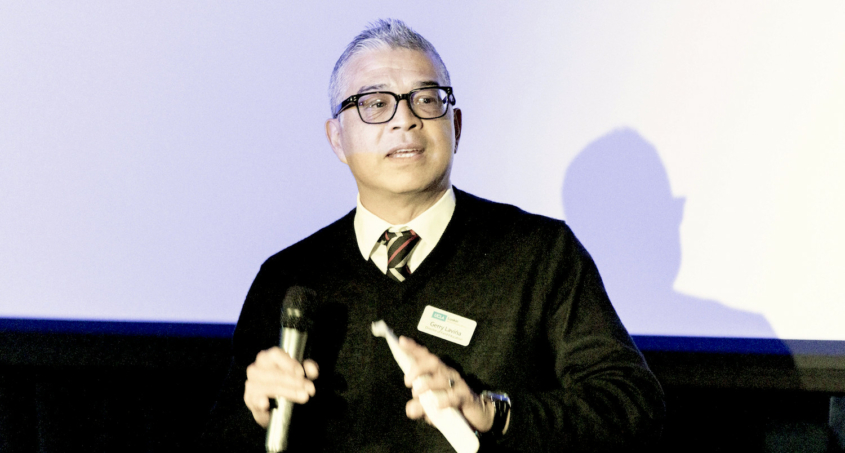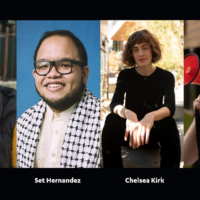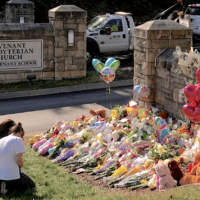
Gerry Laviña, Paying It Forward and Passing the Torch ‘You cannot do this work alone,’ says longtime field education faculty leader as he prepares to retire after four decades at UCLA
By Stan Paul
For Gerry Laviña, the 75th anniversary of UCLA Social Welfare is something to celebrate, but it’s also a bittersweet moment — the Luskin School’s longtime field education director is retiring at the end of the academic year.
“I was here for the 50th anniversary, which was really significant, and now I’m going to end at the 75th. I’ve seen lots of changes, lots of positive changes in our program,” said Laviña, who has worked at the Luskin School for more than three decades.
 His 40-plus-year affiliation with UCLA, which began as an undergraduate student, is a story of personal connection as well as collective achievement — a group effort, he said, that extends far beyond the School and into the community.
His 40-plus-year affiliation with UCLA, which began as an undergraduate student, is a story of personal connection as well as collective achievement — a group effort, he said, that extends far beyond the School and into the community.
“I can happily — and realistically — say there’s been a lot of positive changes in our program due to the hard work of a lot of us who’ve been committed to making it a better place,” he said.
Making Connections
Before Laviña was a master’s student in social welfare in 1986, he was already reaching out to faculty and making connections with the School.
“I made it a point because I was in these large [undergraduate] classes and I wanted to get to know faculty as much as I could. … I just wanted to know why they chose social work. And it was interesting to me. I never imagined it would lead to a position here.”
UCLA Social Welfare instructors and field education faculty became mentors and colleagues to Laviña, continuing after he got his MSW in 1988 and went to work in the community. Among these, Laviña noted, were faculty alumni Joe Nunn and Wanda Ballenger, as well as field education faculty members Jane Kurohara and lecturer Rebecca Refuerzo.
“Rosina Becerra, who became my mentor right before I became director of field education, was a really great mentor to me later in my career,” he said. “We can always use mentors at any point in our career.”
During his time as a social worker at the Didi Hirsch Mental Health Services in Culver City, Ballenger was the field liaison. “She would say, ‘I’m coming by to say hi,’” Laviña explained, and they stayed connected that way during the time when he was a secondary field instructor for some of the UCLA students at Didi Hirsch.
‘My “life lessons,” I called them — my truths — [are] the importance of mentorship, of finding, establishing and maintaining relationships.’
In 1993, Laviña was hired into the field education faculty himself by UCLA Social Welfare. It was a great match.
Nunn also was a longtime director of field education, and he has fond memories of his association with Laviña. When email came into popular use decades ago, Nunn said it was Laviña who sent him his very first email.
“I was fortunate to work with some really good people in the field, and some of them have gone on to do other things,” he said. “It’s been good to see Gerry as the director.”
Now it’s his former student, mentee and colleague who is retiring and passing the torch to someone else, as Nunn did to Laviña.
“You know you’re getting older when the person you hired is retiring,” joked the professor emeritus of Social Welfare. “Gerry was one of the best hires I made while I was there.”
Laviña’s roles and recognitions have included being faculty director of the UCLA Luskin Diversity, Disparities and Difference Initiative (D3) and garnering accolades and awards over his career. This year, he is being honored as UCLA Luskin Social Welfare’s Alumnus of the Year. But, for Laviña, the payoff has always had a forward trajectory.
Paying It Forward
Laviña said Didi Hirsh has long served as a vital training center for social workers and interns.
“Because of that, I got to work with interns from UCLA and other schools and disciplines, and I was constantly asked to present and supervise and teach at Didi Hirsch,” he said.
When Refuerzo was still teaching at UCLA, she would ask Laviña to lecture in her classes. Despite not being keen on public speaking at first, Laviña quickly discovered that he enjoyed mentoring students and that they found value in what he had to say.
“It’s always been the students — what our parents taught us about always giving back — and what my mentors had really given me and pushed me to do,” he said. “Even when I felt I wasn’t ready, they pushed me into other roles. And I honored them by paying it forward in the work I do with students.”
Paying it forward remains a significant part of his teaching and mentoring.
“One of the things I did at orientations this year for first- and second-year students is I gave them — my ‘life lessons,’ I called them — my truths,” Laviña said. “The importance of mentorship, of finding, establishing and maintaining relationships.”
Forging connections is a big part of what social workers do, he said, and he’s always tried to connect students with jobs and internships. “That’s one thing that I feel I’ve done and been pretty successful at for 30 years — one of the things I hope is remembered,” he said.
UCLA students are smart and capable, and this has led to strong relationships building up over time with participating agencies.
“They are committed to taking our students and to working with us, whether the student is excelling or whether the student is having difficulties,” Laviña said. “One of the things that I learned as an MSW student from the first year and throughout my career … you cannot do this work alone.”








Leave a Reply
Want to join the discussion?Feel free to contribute!